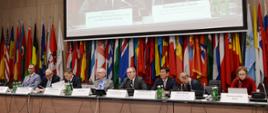OSCE Asian Partners for Co-Operation Group Meeting on perspectives of enhancing stability in Indo-Pacific region
17.11.2023
The participants of the conference discussed the key challenges for the Indo-Pacific region with the aim to analyse interdependencies between the OSCE area and the Indo-Pacific region as well as to exchange experience on how to address global challenges.

Ambassador Adam Hałaciński, Permanent Representative of Polish to the OSCE and Chair of the OSCE Asian Partners for Co-operation Group (APCG), highlighted in his opening speech the shift in the geopolitical centre of gravity to the Indo-Pacific region. He referred to the Indo-Pacific Strategy (2022) of the Republic of Korea, which, in its holistic approach, identifies the rules-based international order and cooperation in promoting the protection of human rights as key factors. The Ambassador drew attention to the need of developing resilience to threats as an important element of an effective strengthening of international security. As an example of Poland’s commitment on the international stage, he mentioned the UN General Assembly resolution, adopted in 2023, at the initiative of Poland, on building resilience through infrastructure connectivity. - Cooperation on cybersecurity, countering disinformation as well as hybrid threats is key to building resilience in these challenging times - said Ambassador Hałaciński.
Ambassador Sangwook Ham, Permanent Representative of the Republic of Korea to the OSCE, referred to the cross-border and global nature of security threats in the Indo-Pacific region. He emphasised the desire of the countries of the region to strengthen stability and build prosperity as cohesive factors for the region. - We need partnerships based on values and shared interests - said Ambassador Ham.
During the panel discussion, Sang-uk Yoon, Deputy Director General of Strategy at the Ministry of Foreign Affairs of the Republic of Korea, presented the vision and initiatives of Korea with regard to engagement in the Indo-Pacific region, recalling the Republic of Korea's strategy for a free, peaceful and prosperous Indo-Pacific. He stressed the need to strengthen international solidarity based on common values and the importance of trans-regional cooperation between Europe and Asia. In his speech, Witold Sobków, Political Director at the Ministry of Foreign Affairs, stressed the need for flexibility in relation to the dynamically changing international environment; the need to exchange information in order to respond effectively to changes and pointed to the need for active involvement of states in defending the rules-based international order. Bo Ram Kwon, an analyst at the Korea Institute for Defense Analysis (KIDA) presented the Indo-Pacific region's approach to global security challenges, ideas for developing trans-regional cooperation and efforts to build regional resilience. Patryk Kugiel, an analyst at the Polish Institute of International Affairs (PISM), highlighted the interdependence of the security and prosperity of Europe and the Indo-Pacific region and presented an analysis of the main challenges for the region. In his presentation, he also pointed to areas in which the OSCE has experience and knowledge to be used in the process of stabilizing the security situation in the Indo-Pacific region. In particular, it concerns confidence-building measures and capacity-building activities.
The Asian Partners for Co-operation Group (APCG) provides a platform for the development of OSCE cooperation with Asian partners, i.e. Afghanistan, Australia, Japan, the Republic of Korea and Thailand, through discussions, exchange of experience and best practices, and creation of synergies. The conference organized in cooperation with the Republic of Korea was the last meeting of this year's (2023) Polish presidency of the OSCE Asian Partners for Co-operation Group.
Photos: Micky Kroell/OSCE







